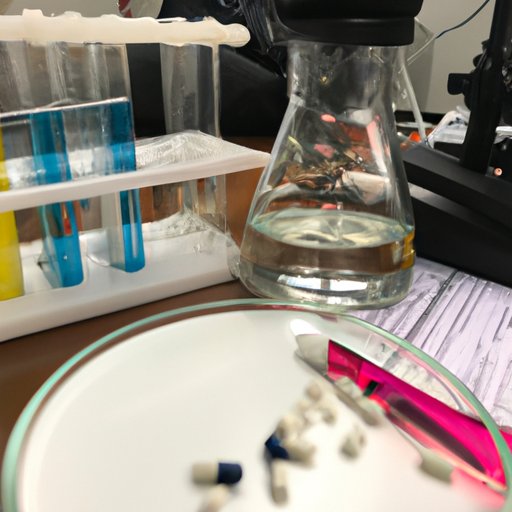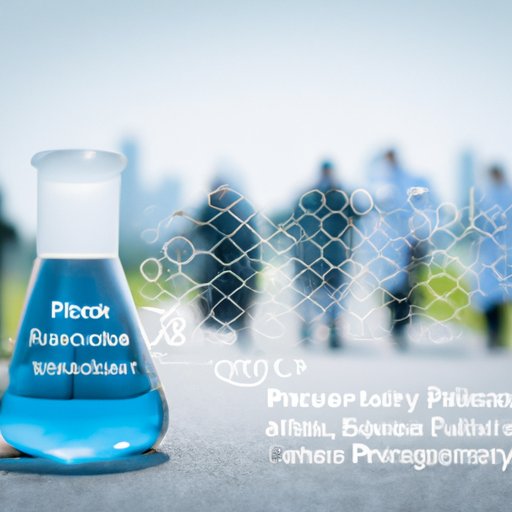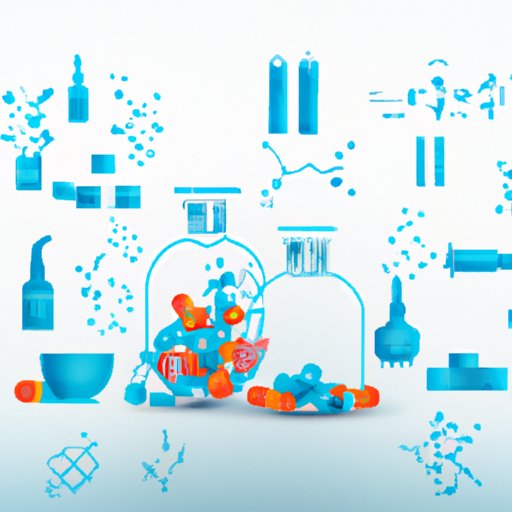Introduction
Pharmaceutical sciences are a set of interdisciplinary areas of study that focus on the development of drugs and their use in medicine. It encompasses many different disciplines, such as chemistry, pharmacology, toxicology, and clinical research, and is an essential component of modern healthcare. In this article, we will explore what pharmaceutical sciences are, the different disciplines involved, and the impact they have on healthcare and society.
Exploring the Basics of Pharmaceutical Sciences: An Overview
Pharmaceutical sciences involve the discovery, development, and evaluation of drugs used in the treatment and prevention of diseases. The goal of pharmaceutical sciences is to develop safe and effective medications that can be used to improve the health and quality of life of individuals. To achieve this goal, pharmaceutical scientists must investigate the core areas of pharmaceutical sciences, which include drug design, drug delivery, pharmacokinetics, and pharmacodynamics.
Drug design is the process of creating new medications by combining existing chemicals or molecules. This involves understanding the structure and function of the target molecule, as well as the properties of other molecules that may interact with it. Drug delivery is the process of delivering a medication to its intended site of action. This includes developing formulations that can effectively transport the drug through the body and into the desired location. Pharmacokinetics is the study of how the body absorbs, distributes, metabolizes, and excretes a drug. Finally, pharmacodynamics focuses on how a drug interacts with its target and the mechanisms of action that lead to its therapeutic effects.
In addition to these core areas, pharmaceutical sciences also encompass the role of drug development. This involves the preclinical and clinical phases of drug development, as well as regulatory review and approval. During the preclinical phase, scientists develop a hypothesis and test the safety and efficacy of the drug in animal models. If the results are promising, the drug enters clinical trials, where it is tested in humans. Once the drug has been tested in clinical trials and found to be safe and effective, it is submitted to the relevant regulatory agency for review and approval.

A Closer Look at the Different Disciplines Involved in Pharmaceutical Sciences
Pharmaceutical sciences involve several different disciplines, each of which plays an important role in the development of medications. Let’s take a closer look at some of the main disciplines and how they contribute to pharmaceutical sciences.
Chemistry
Chemistry is an important discipline in pharmaceutical sciences, as it is responsible for the design and synthesis of new drugs. Chemists use their knowledge of organic and inorganic compounds to create new molecules that may have therapeutic benefits. They also work to optimize the structure and properties of existing drugs to make them more effective or reduce side effects.
Pharmacology
Pharmacology is the study of how drugs interact with living organisms. It provides an understanding of the mechanisms of action of drugs, as well as their pharmacological effects. Pharmacologists also evaluate the toxicity of drugs and assess their potential risks and benefits.
Toxicology
Toxicology is the study of the adverse effects of drugs and chemicals on living organisms. Toxicologists investigate the toxic effects of drugs, as well as their potential interactions with other substances. They also develop methods to detect and measure toxicity in order to ensure the safety of medications.
Clinical Research
Clinical research is a critical component of pharmaceutical sciences. It involves conducting clinical trials to assess the safety and efficacy of drugs in humans. Clinical researchers also collect data to understand how a drug affects different populations, as well as its long-term effects.

Understanding the Impact of Pharmaceutical Sciences on Healthcare and Society
Pharmaceutical sciences have had a major impact on healthcare and society. The development of new drugs has made it possible to treat a wide variety of conditions, from cancer to infectious diseases. This has resulted in improved outcomes for patients and reduced mortality rates. Pharmaceutical sciences have also enabled personalized medicine, allowing doctors to tailor treatments to the individual needs of their patients.
However, there are still challenges facing pharmaceutical sciences. For example, drug development is an expensive and time-consuming process, and it can be difficult to identify new molecules with therapeutic potential. In addition, drug resistance is becoming increasingly common, making it difficult to treat certain conditions. Finally, there is a need for more research into the potential risks of medications, as well as more effective ways to manage side effects.
Conclusion
Pharmaceutical sciences are an essential component of modern healthcare, encompassing many different disciplines and contributing to the development of new drugs. By understanding the basics of pharmaceutical sciences and the different disciplines involved, we can gain a better appreciation of the impact they have on healthcare and society. Although there are still challenges facing pharmaceutical sciences, it is clear that they have made a significant contribution to improving the health and quality of life of individuals around the world.
(Note: Is this article not meeting your expectations? Do you have knowledge or insights to share? Unlock new opportunities and expand your reach by joining our authors team. Click Registration to join us and share your expertise with our readers.)
